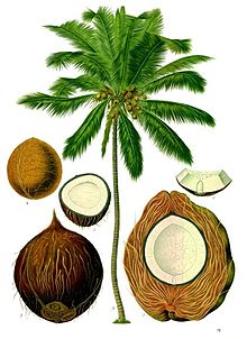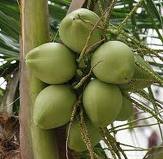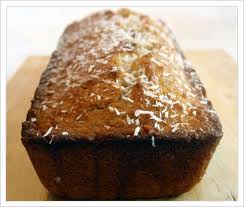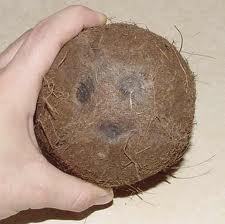Coconut Oil
by Dr. Bera Dordoni
Yes, coconut oil is good for you!
When I spoke to my dad on the phone the other night, I could hear from his sexy, deep voice that he had a chest cold.
I know what you’re thinking: “Big deal! It’s cold and flu season everywhere!” Except my dad is in his mid-eighties and his lungs are not his strongest organs. In my heart, I knew I was listening to the harbinger of pneumonia.
I asked him to immediately stop ingesting those things that might have caused his immunity to weaken condition—the junk food he loves that’s filled with sugar, white flour, trans-fatty acids or rancid oils, etc.—and start taking the things that help rid his body of the congestive condition naturally.
I asked Rosie, a friend of his who was at the house, to get on the phone so I could give her some instructions. I should have known better—right away, she resisted what I tried to tell her. She wanted to simply get him over to the ER so he could get some antibiotics into his system. She didn’t want him messing around with “all that voodoo stuff.”
Resisting the urge to sigh (or scream), I explained as gently as possible that our family doesn't operate that way. We seek the source or cause of a problem so we can truly eliminate the accompanying condition; we try to avoid the suppressive effects of synthetic medications and their harmful side effects.
Rosie is intelligent and sweet and cares very much about my father's health, so she was willing to listen. I told her my dad doesn't take any medications whatsoever to keep him going. She, in turn, listed all the meds she takes for allergies, blood pressure, cholesterol, arthritis, and other assorted conditions. I told her I had been advising my father on his health for years now, and he didn't suffer from any of these conditions. She got my drift.
Then I asked her if dad was taking his coconut oil.
Exit My Drift, Enter Her Outrage
“Are you crazy?!” she stormed. “Don't you know coconut oil is nothing but saturated fat? What are you trying to do, raise his cholesterol levels and give him a heart attack?” As for herself, she proudly announced, she uses only canola oil when she cooks and good olive oil for salads.
Okay, there was hope. I praised her for using olive oil on her salads, adding that I hoped it was from virgin olive oil that had been cold-pressed. I also mentioned, almost as an aside, that if might want to do some research into the truth about the man-made canola oil she uses for most of her cooking.
“I don’t think you realize all the beneficial qualities of pure, unadulterated coconut oil that hasn’t gone through any hydrogenation process,” I said.
“Oh, really?” she countered. “Like what?”
So this is what I told her.
Good Fat, Bad Fat
First, yes, coconut oil is saturated fat. But just like good and bad cholesterol, there’s good and bad saturated fat. The particular kind of fat in coconut oil is composed of medium-chain fatty acids, which are metabolized as soon as consumed. They’re never converted into cholesterol or body fat, unlike the bad kind of saturated fat, which is.
Your body doesn’t have to emulsify coconut oil with bile salts because it’s absorbed directly from the small intestine to the liver, where it is immediately converted into usable energy. In effect, coconut oil stimulates your metabolism. A stimulated metabolism can not only help lower cholesterol levels, it can help the body release weight, rather than gain it.
Yup. Oil that can help you lose weight. Good fat. Ain’t nature grand?
“But fatty foods can cause blood clots!” Rosie said, adroitly echoing hundreds of magazine articles and product-promoting (i.e., not information disseminating) commercials.
Very true. The kind of fat found in lard, butter, vegetable oils, and even some olive oils earns its bad reputation by promoting “sticky platelets,” which can, indeed, increase the chance of developing clots. But that’s not the kind of fat found in coconut oil.
See, coconut oil’s medium-chain fatty acids have a similar effect to fish oil’s omega-3 fatty acids—and everybody knows about fish oil, right? Its fatty acids have the opposite effect of the other, icky saturated fats. Instead of creating clots, it helps break them up.
“Wow,” said Rosie.
“Wow is right,” I said. “But that’s not all. In fact, it’s just the beginning!”
Study the island cultures where coconuts grow and are consumed as a matter of course, and you’ll find those folk never seem to come down with the kind of ailments we sophisticated folks get out here in the city. Why? ‘Cause they've been using coconuts and coconut oil for centuries to ward off maladies for which we commonly run to get treated by modern drugs. No defense against the common cold? Ha! The immune-enhancing properties of coconut oil’s fatty acids are anti-microbial, anti-viral, anti-tumor, and anti-fungal. Let’s see a cold stand up against that!
“But how does it work?” Rosie wanted to know.
“Simple!” I said. “Well, not really simple… Okay, take a deep breath. Here we go…”
To Make a Long Story Short
The largest medium-chain fatty acid is lauric acid, a string of 12 carbon atoms. Lauric acid is well-known in naturopathic circles for its antiviral, anti-microbial, anti-fungal and anti-tumor benefits.
The richest natural source known of lauric acid is mother’s milk. Ingesting mother’s milk as an adult is not really all that convenient or easy to find. The second richest natural source, however, is coconut oil. Approximately 50% or more of a coconut’s fatty-acid content consists of lauric acid.
By the way, the only oils that contain lauric acid are coconut oil, palm kernel oil and butter—and butter’s lauric acid content is only about 3%, nowhere close to coconut oil’s content. Plus, coconuts also have other medium-chain fatty acids, such as caprylic acid (approx. 8%) and capric acid (approx. 7%). Both provide good health benefits.
In short, daily use of coconut oil helps kill viruses, bacteria, fungi and yeast. It helps infants and the elderly assimilate nutrients and improve digestion. Daily usage can help control diabetes, lower bad cholesterol, reduce sticky blood platelets, and repair free-radical injuries. People with low thyroid find it can increase their energy by taking stress off the thyroid gland. It softens the skin, it helps release excess weight.
“So I should use it every day,” Rosie said, cutting me off.
I guess I was getting carried away. I do that sometimes.
In the end, she agreed to make sure dad took his coconut oil, and I agreed to send her the name of one of the best books I've read about the stuff: The Healing Miracles of Coconut Oil, by Bruce Fife, N.D. (2001, Picadilly Books, Ltd., Colorado Springs, CO). Fife provides in-depth information about the extensive research that’s been done on the subject. The book is reader-friendly and easy-to-understand. What more could she want?
I also slipped in a plug for an excellent article on the devastating effects of trans-fatty acids as weapons of mass destruction, “WMDs: Much Closer Than You Think,” Ellen Troyer, MT MA, the Chief Research Officer at Biosyntrx (2/20/04, http://www.biosyntrx.com). But I think I’m getting carried away again.

From Wikipedia: The coconut palm, Cocos nucifera, is a member of the family Arecaceae (palm family). It is the only accepted species in the genus Cocos.[2] The term coconut can refer to the entire coconut palm, the seed, or the fruit, which is not a botanical nut. The spelling cocoanut is an old-fashioned form of the word.[3] The term is derived from 16th century Portuguese and Spanish cocos, meaning "grinning face", from the three small holes on the coconut shell that resemble human facial features.
Found across much of the tropic and subtropic area, the coconut is known for its great versatility as seen in the many domestic, commercial, and industrial uses of its different parts. Coconuts are part of the daily diet of many people. When young, the entire fruits are used as melons. When mature, only the seeds are used as nuts. Its endosperm is initially in its nuclear phase suspended within the coconut water. As development continues, cellular layers of endosperm deposit along the walls of the coconut, becoming the edible coconut "flesh".[4] When dried, the coconut flesh is called copra. The oil and milk derived from it are commonly used in cooking and frying; coconut oil is also widely used in soaps and cosmetics. The clear liquid coconut water within is a refreshing drink and can be processed to create alcohol. The husks and leaves can be used as material to make a variety of products for furnishing and decorating. It also has cultural and religious significance in many societies that use it.



Where Can I Get More Information?
Begin
Your Journey to Independent Health:
"The Truth About Coconut Oil: Why it Got a Bad Rep When It's Actually Good," by Dr. Joseph Mercola

http://www.westonaprice.org/know-your-fats/new-look-at-coconut-oil
Coconut Info. com
Research on Coconut Oil
I’ve
been trying to get my family to use coconut oil for at least ten years,
especially in cooking, but could never find an oil that tasted good
enough to persuade them to give up butter. We’d try this brand and that,
and then it was back to the butter. Until—ta da! I found Virgin Coconut
Oil produced by Tropical Traditions http://www.tropicaltraditions.com.
How
can I describe it to you? Let me count the … no, no, you've got to
taste it for yourself. It's like eating coconut cream. It goes down oh
so nice. And the smell! I love to put it on head to toe after a shower.
Ever
found an oil that absorbs completely into the skin without getting on
your clothes and ruining them? Tropical Traditions Virgin Coconut Oil.
If I get it on my hands when I’m cooking, it comes right off with a
little warm water—I don’t even have to use soap! It's the cleanest oil
I've ever worked with. Comes right off dishes, too, with or without dish
soap.
We
even feed it to our dogs. (Five. We have five dogs. No cats, no birds,
just dogs. Lots of dogs.) My husband and I adopt handicapped, often
blind dogs from rescue shelters. Most have been abused and/or abandoned,
and they come to us malnourished with dull coats. Of course, you’d
never know it to see them today. No one who meets our furry children can
believe they were once emaciated-looking with horrible breath and
rotting teeth. Besides their excellent diet (click here for more about
raising healthy animal companions), I firmly believe coconut oil has
contributed to their now thick, lustrous coats. Take my 19-year-old
Maltese mix, for example. She was rescued from a dumpster, starving to
death. We mixed coconut oil into her food, and she immediately started
growing fur on her bare patches. Not to mention…
I’m getting carried away again, aren’t I? Okay, no more stories—except to say, one last time:
Try some coconut oil!